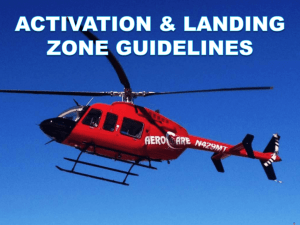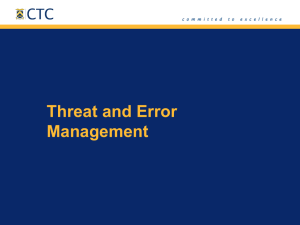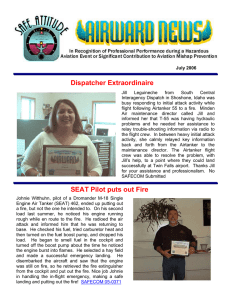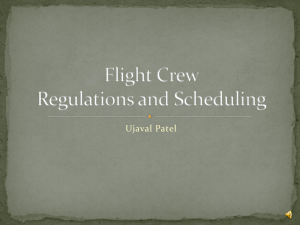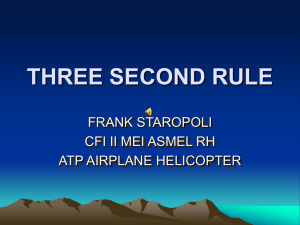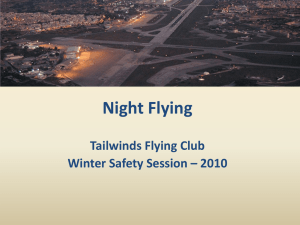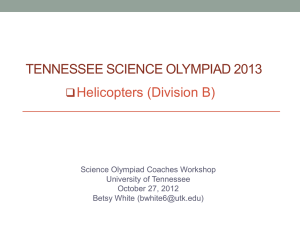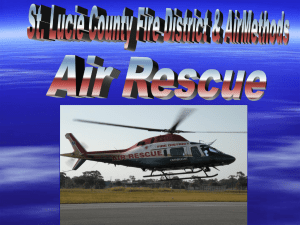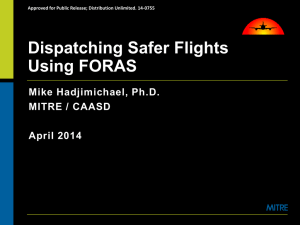CareStar
advertisement
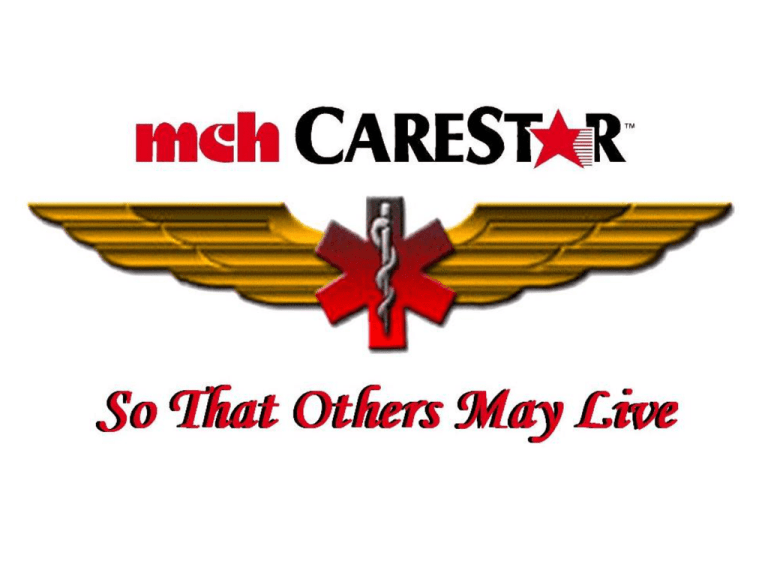
OBJECTIVES Activation Guidelines Communications Weather Landing Zone Air Medical Flight Crew Based at Medical Center Hospital in Odessa, Texas Highly Trained Flight Crew Pilot Registered Nurse EMT Paramedic Rotorcraft – Bell 407 Length (rotor turning)…...41.8 ft Width (rotor turning)…..…35 ft Max Cruise Speed…………160 mph Maximum Range……………350 miles RESPONSE TIME AUTO-LAUNCH In Air In Less Than 5 Minutes From Dispatch Patient Is Definitely In Need Of Air Transport Ground Crew May Cancel Flight At Any Time If Patient Is Not In Need Of Air Transport Service Area 150 Miles COST $ Please Inform Com. Center If Helicopter Is Not Needed, ASAP $ Lean On Side of “Just in Case” Rather Than “Wait To Be Sure” $ Requesting Party Will Never Be Charged for Flight or Requesting Helicopter $ Patient Care is Priority $ Medical Necessity Is Key $ Carestar Will Never Make Payment Arrangements or Ask for Proof of Insurance Before Accepting Patient Activation & Landing Zone Guidelines ACTIVATION CRITERIA Trauma relating to oil field accidents – Severe Head Injuries – Chest Injuries – Major Extremity Injuries and Fractures – Falls from over 20ft – Burns (Thermal, Electrical, Chemical) – All Other Medical Conditions (Heart Attack, Stroke, or Diabetic Emergencies) ACTIVATION Scene Trauma – Situational factors • Mass Casualty Incidents • Rural or Isolated Areas • Limited Ground Ambulance Access or Egress • Limited Access to Medical Care • Scenes Involving Long Extrication Times Taking Time Away From The Golden Hour CONTRAINDICATIONS • Mission – To Provide Safe and Rapid Transport of Critically Ill or Injured Patients to the Most Appropriate Facility • Contraindicated Transports – Traumatic Arrest Prior to the Arrival of Carestar – Recurrent Cardiac Arrest ALS Support Transport Post-Resuscitation – HAZMAT Patients COMMUNICATIONS 1-877-730-0009 Initial Information Who, What, When and Where Has EMS and Law Enforcement Been Contacted? Specific Location of Scene or Patient How Many Patients Do You Have? How Dispatch / Flight Crew Contact personnel at scene? GPS Coordinates Helpful - Use Degrees and Minutes Should Always Be Used in Conjunction with Other Directions Dispatch Information Provides Flight Crew Communications with LZ Coordinator Minimize Radio Traffic Must Have Clear and Concise Directions Communication Priorities (Be Specific) Scene Location Landing Zone Description Landing Zone Hazards Patient Information WEATHER CONDITIONS Always Call Pilots Responsibility to Make Final Decision Do Not Assume Anything Storms Can Be Localized Weather Minimums Vary depending on location, terrain, etc. Ceiling and visibility WEATHER CANCELATIONS Rendezvous Is An Option If Forced to Abort Mission for Weather You Will Always be Notified Immediately by Dispatch Night Considerations If EMS On Scene Scene Strobes Visible for Miles – Easier for Ground Units to See Aircraft Coming Please - No Lights Shining Toward Cockpit Small Amount of Light Dissipates Across Large Area of Windshield – Be sure to communicate every hazard in area even if you think the crew saw them LANDING ZONE • 100 x 100’ At Nighttime Hours • 80 x 80’ During Daylight Hours • Slope <10° • Approach / Depart INTO Wind • Treat LZ (Helicopter) as “HAZMAT” – Scene Should Be UPWIND of LZ – LZ Should Be DOWNWIND of Scene/Patient Location to Prevent Blowing Debris on Scene LANDING ZONE SURFACE • • • • • Grass Concrete Gravel Pavement Dusty ground – Recommended To Wet, If Possible LANDING ZONE HAZARDS Wires Invisible From the Air Advise Dispatch / Flight Crew of Location Shine Spotlights on Poles Park Vehicles Underneath, if possible Landing Zone Preparation Perimeter Security / Safety Team – ALL ACCESS to LZ Must Be Secure – All Traffic Needs To Be Blocked With Vehicles, If Possible – Keep All Bystanders and Personnel At Least 100’ Away From LZ – Protect The Patient GROUND OPERATIONS LZ Coordinator At End of LZ In Front of Helicopter Landing Site Maintains Communication With Both Scene Personnel and Helicopter Communicates With Flight Crew, If Possible Provide Scene Safety Around Aircraft GROUND OPERATIONS Always Approach And Depart As A Group (Follow The Instructions Of The Flight Crew Members) Stay Within Full View Of The Pilot Keep In Front Of The Aircraft Keep Away From The Tail Rotor Never Go Behind Tail Guard or Vertical Stabilizer Controlled Slow, Purposeful Movement No Running SUMMARY Call 1-877-730-0009 To Activate CareStar Setup LZ While CareStar Is En Route Call Coordinates To Dispatcher Radio Description, Cell Phone Number, Winds, Contact Person Name, And Hazards To Helicopter, If Possible CareStar Treats, Packages and Transports Patient To The Nearest Appropriate Facility
